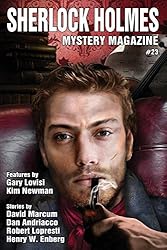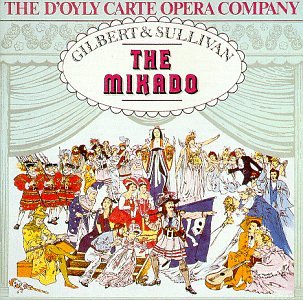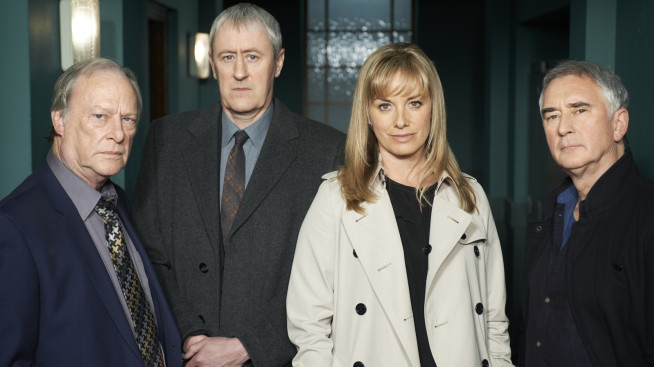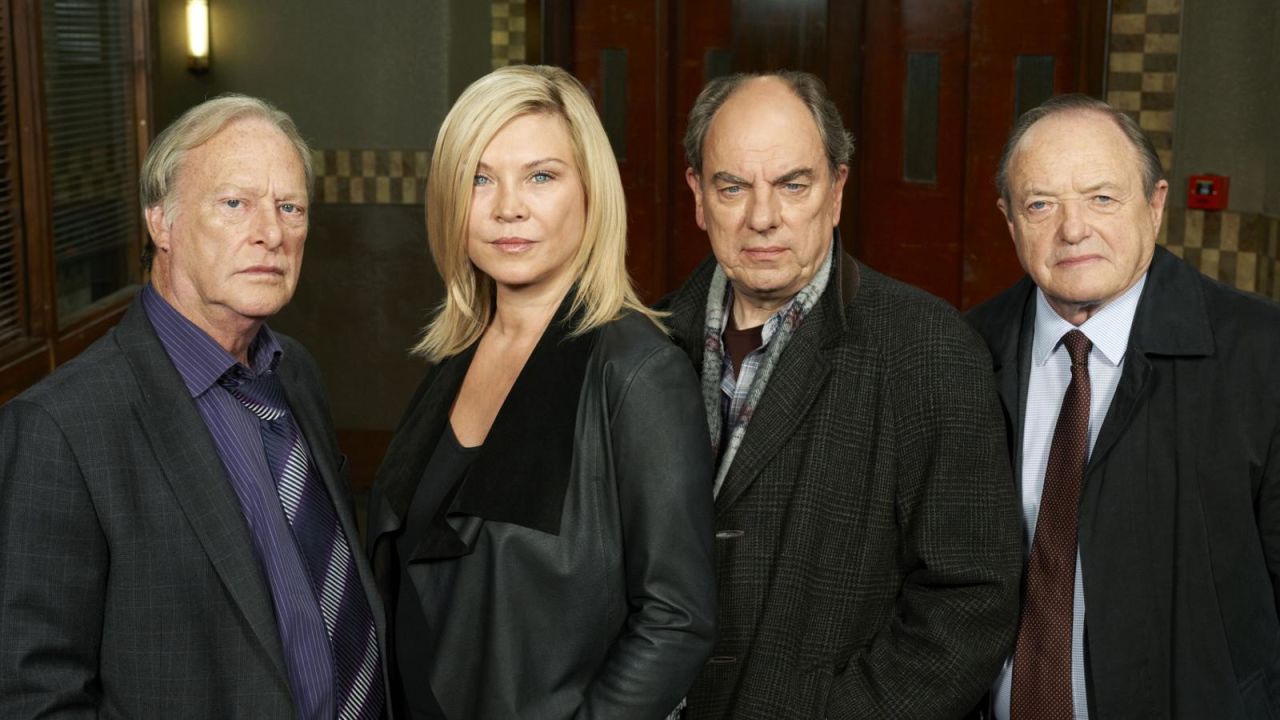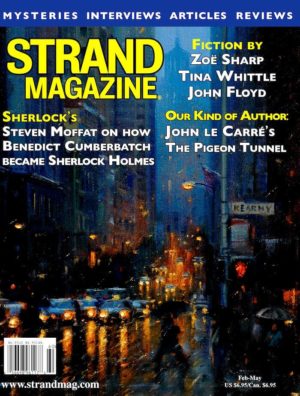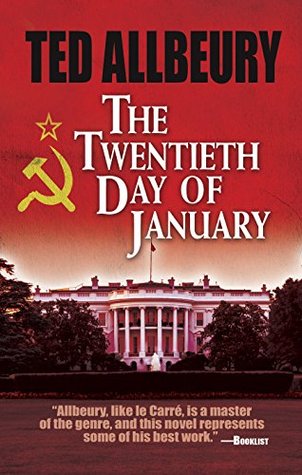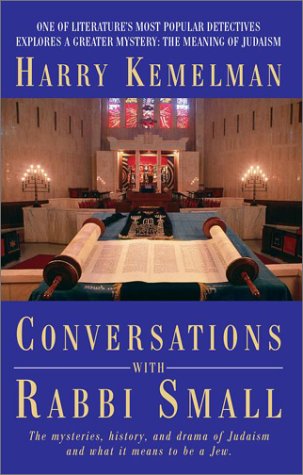by B.K. Stevens
If
we were asked to name the quintessential fictional detective, most of
us would probably reply, "Sherlock Holmes." Poe's Dupin came before him,
and some fictional detectives who came after him may have greater
psychological depth. Even so, Holmes' dazzling deductions and indelibly
distinctive personality have given him enduring worldwide appeal. He's
the icon who set the standard for the Golden Age, the epitome of the
cerebral detective. And, as I'm about to argue, he's very, very English.

Does
America have its own Sherlock? We definitely have iconic fictional
detectives. The first names to come to mind might be Sam Spade or Philip
Marlowe, Kinsey Millhone or V.I. Warshawski--tough-talking,
life-hardened private investigators who walk the mean streets with both
guns and cynical quips at the ready. They're smart, no doubt about it.
But their appeal may be based on their attitudes, as much as on their
intellects. And their success at solving crimes may depend on their
ability to intimidate witnesses and outfight bad guys as much as on
their deductive powers. America does have some memorable cerebral
detectives--Nero Wolfe, for example, and Ellery Queen. Much as their
fans might disagree, though, I'd hesitate to call them distinctively
American. In some ways, they're almost too much like Sherlock
Holmes--arrogant manners, aristocratic tastes. For me, at least, an
American Sherlock ought to embody more democratic traits and attitudes.

Let
me propose another candidate. Like Holmes, Lieutenant Columbo relies on
his wits to solve cases, not on a gun or his fists. (In fact, while
Holmes often carries a gun and sometimes throws a punch, I can't think
of a single time when Columbo does either.) Both detectives are
incredibly observant, and both excel at sizing up suspects. But there
are significant differences, too, and I'd say these differences stem
from the fact that Holmes is English and Columbo American.
Let's
start with names. A name can't get much more thoroughly English than
Sherlock Holmes--unless it's Sir Arthur Conan Doyle. Even most of the
actors who have played Holmes have had distinctively English names, from
Basil Rathbone to Benedict Cumberbatch. (And all right, once in a while
a Robert Downey, Jr., will sneak in, or even--good grief!--an Igor
Petrenko, in a Russian television series. The general point still
holds.)

America's
Sherlock, by contrast, has an Italian last name. Was it inspired by the
explorer credited with discovering the new world? When asked in 1986,
one of the writers who created the character said he couldn't remember
how they came up with the name--maybe they were thinking of Columbus, or
maybe they were thinking of a restaurant called Palumbo's. Those
writers, by the way, were Richard Levinson (Jewish) and William Link
(mixed German Hugenot and Jewish descent). The actor who portrayed
Columbo was Peter Falk (also Jewish, from families that immigrated from
Eastern Europe). So Columbo emerged from a hodgepodge of nationalities
and ethnicities, from the descendants of a bunch of immigrants. What
could be more American?

The
fact that so many people contributed to the creation of Columbo also
seems appropriately American. Sherlock Holmes was the brainchild of one
writer and made his debut, of course, in print, in the pages of a series
of short stories and novels. Columbo emerged from what might be
considered the more democratic medium of television. Whatever its
shortcomings, television depends upon a group of people working
together--writers, actors, directors, producers, musicians, technicians,
and so on and so on--and it aims for a wide audience. At its best,
television also offers opportunities to talented newcomers--such as a
twenty-one-year-old kid named Steven Spielberg, who got one of his first
big breaks when he directed "Murder by the Book," which many people
consider one of the stand-out episodes of
Columbo's first season,
perhaps of the series as a whole. Whether you love television or hate
it, it seems hard to deny that it embodies central democratic
ideals--many people from diverse backgrounds working together toward a
common goal, encouraging those just starting out to fulfill their dreams
by going as far as their abilities will take them.

What
about Columbo himself? He's definitely not an aristocrat. The way he
talks, the way he carries himself, the car he drives, the chili he
eats--everything tells us he's from a middle-class or working-class
background. His appearance confirms it. Like Sherlock Holmes, he has a
distinctive style of dress. But Sherlock's clothes set him apart--the
deerstalker hat, the caped coat. Columbo wears a rumpled suit and a
shabby raincoat (almost always the same ones, from Falk's own closet).
If his clothes set him apart, it's because he looks less imposing than
other people, certainly far less imposing than the high-class types
involved in the cases he investigates. In an interview with David Fantle
and Tom Johnson, Peter Falk commented on the contrast: "Columbo is an
ass-backwards Sherlock Holmes. Holmes had a long neck, Columbo has no
neck; Holmes smoked a pipe, Columbo chews up six cigars a day."
In
an interview with Mark Dawidziak, Falk made another comment about the
contrast between Holmes and Columbo, this one focusing on the way others
perceive the two detectives. He's talking about the second episode in
the series, which centers on a faked kidnapping: "I'm not a mystery fan,
but as a kid I read Sherlock Holmes. I remember being very impressed by
Sherlock Holmes. He'd show up, and everybody would turn to him for the
answer. I thought it was important in the opening of
Ransom for a Dead Man
that no one turn to me for anything. I was just a local. All these FBI
agents had their job to do. I couldn't know anything except maybe he
name of a certain street. I wanted to be ignored. . . . . Nobody wanted
to know this guy's opinion, There's a lack of pretension. You expect
something quite different from a great detective."

We
definitely get something quite different from most great fictional
detectives, definitely including Holmes. I don't know if it's accurate
to call Holmes pretentious: He is, in fact, superior to everyone else,
so there's no pretension involved. But he certainly doesn't try to hide
his superiority. Apparently, in Conan Doyle's stories and novels, Holmes
never actually says, "Elementary, my dear Watson." He does, however,
sometimes say "elementary"--or something along the same lines, such as
"it is simplicity itself"--to make it clear he can easily figure out
something that baffles others. Some might call his manner arrogant;
others might say he treats most of the people he encounters with
disdain; still others might protest that he's simply being
straightforward. But I don't think words such as "humble" or
"self-effacing" come readily to mind when we think of Sherlock Holmes.
Columbo,
on the other hand, is extremely humble and self-effacing. He constantly
expresses admiration for other people's expertise and accomplishments,
constantly acts as if he thinks they're much sharper than he is,
constantly seems awed thy their jobs, their houses, their cars, their
shoes. Part of it, of course, is shtick: Columbo throws suspects off
guard by pretending to be dumb, so they'll relax too much and tumble
into the traps he sets for them. But part of it, I think, is sincere.
Even when he suspects people of murder, I think he's often genuinely
impressed by their knowledge and talents.

Clearly,
he doesn't mind letting people underestimate him, doesn't mind letting
them think they're more important than he is. Even his trademark "one
more thing" seems like an acknowledgment of his inferior status: The
people he's pestering are so superior that he hates to take up their
valuable time. The most he can hope for is that they'll indulge him for
just a few moments more. Would Holmes be so comfortable about letting
others regard him as inferior? I don't think so. I think it would drive
him crazy. But Columbo has more democratic attitudes. He doesn't need to
have everybody see him as the smartest person in the room. If they see
him as no more than a regular guy, or even as less than that, that's
fine with him.
What's more, I think Columbo honestly
sees himself as a regular guy. When he describes his approach to
detection, he doesn't talk about his brilliance. He's not so taken with
his deductive powers that he thinks he can rely on those alone. No, he
attributes his success to things Americans traditionally value, such as
hard work. In "The Bye-Bye Sky High I.Q. Murder Case," Columbo talks to
a man (the murderer, as Columbo already suspects) who belongs to a
Mensa-type organization:
You
know, sir, it's a funny thing, All my life I kept running into smart
people. I don't just mean smart like you and the people in this house.
You know what I mean. In school, there were lots of smarter kids. And
when I first joined the force, sir, they had some very clever people
there. And I could tell right away that it wasn't gonna be easy making
detective as long as they were around. But I figured, if I worked harder
than they did, put in more time, read the books, kept my eyes open,
maybe I could make it happen. And I did. And I really love my work, sir.
I
may be wrong, but I don't think Columbo is being falsely modest here,
and I don't think he's just trying to throw the murderer off guard. In
fact, I think he may be giving the murderer a kind of warning: Even if
the murderer is smarter, Columbo may still catch him, because Columbo
works harder. And hard work
is a distinguishing feature of
Columbo's approach. Even after the other police personnel are packing up
and getting ready to leave a crime scene, Columbo is still crawling
around on the floor, pawing through the carpet, searching for any shred
of evidence that might help him understand what happened. Like Holmes,
he's observant--he keeps his eyes open, as he says--but that's partly
because he keeps looking after others have decided there's nothing more
to see. Suspects complain about how often he keeps showing up, how long
he hangs around. And he reads the books, learning whatever he can about
the suspects and their areas of expertise. If he suspects a winemaker
killed his brother, Columbo studies up on wine. If he thinks an expert
on subliminal suggestion committed murder, Columbo reads the books the
expert wrote and uses subliminal suggestions to lure him into
incriminating himself. So Columbo embodies a fundamental American
belief. You don't have to be born rich and powerful to succeed. You
don't even have to be extraordinarily talented. As long as you're
willing to work hard and never give up, you can get ahead.

Columbo
also talks about his approach to detection in one of the more recent
episodes, "Columbo Goes to College." He's a guest lecturer in a
criminology class, and a student asks what advice he'd give a young
detective. Columbo's advice is simple: "Don't talk too much." When the
student is surprised, Columbo explains:
Well,
sometimes, when you know something, it's better to keep it to yourself.
You don't have to blab everything right away. Wait. Who knows what will
happen? Timing. That's important, And lucky. You got to be lucky.
This
statement definitely isn't just shtick. The murder hasn't been
committed yet--Columbo has no reason to suspect these students of
anything. I think he's being completely open, genuinely modest. Don't
show off by broadcasting everything you know, he says. Wait, even if it
means people don't realize how smart you are. That's something anyone
can do, regardless of wealth or power or anything else. Waiting may help
you succeed--but if you do succeed, remember that it's partly because
of luck, not because of any merit you can claim. How much more
democratic can a statement about detection get?

It's
also worth noting that when Columbo gives the class this advice, two of
the students--smart students from wealthy, prominent families, students
who are about to murder a professor by using a remarkably clever method
that requires both technical know-how and a fair amount of money--don't
pay attention. Instead, one turns to the other and whispers, "I wonder
who his tailor is." These smug, aristocratic students underestimate
Columbo because he looks so low class. They should have listened. After
they commit their clever murder, Columbo suspects them almost
immediately.
Columbo tends to suspect smug,
aristocratic types. In "Columbo Goes to College," the upper-class
students try to frame a heavy-drinking ex-con, but Columbo doesn't fall
for it. Instead, he keeps zeroing in on the students. Jeff Greenfield
comments on that feature of the series in a 1973 article called "Columbo
Knows the Butler Didn't Do It." (It's available online--you have to
squint to read the tiny print in the PDF, but it's worth it.) As
Greenfield notes, "The one constant in
Columbo is that, with
every episode, a working-class hero brings to justice a member of
America's social and economic elite." By doing so, Columbo proves that
his opponents often don't deserve the privileges they enjoy, that he can
best them by being more diligent, more determined. And with every
victory, he affirms our faith in democratic ideals.

If
we share those ideals, should we embrace Columbo and reject Sherlock
Holmes? Of course not. America, at its best, also values diversity.
There's room for everyone, even for a moody loner who thinks he's better
than the rest of us. If Holmes and Columbo met, I think they'd get
along fine. Holmes might look down on Columbo at first, but he's smart
enough to learn to respect him. Columbo might be amused by Holmes's
haughty ways, but I think he'd also admire him. Unlike some of the
snooty types Columbo encounters, Holmes works hard, and he's earned the
distinction he enjoys. And both Holmes and Columbo are devoted to
justice, to seeing that the truth is ferreted out, to making sure the
guilty are punished and the innocent exonerated. Those are qualities all
of our great fictional detectives share, regardless of nationality,
manner, or attitude. Once Holmes and Columbo got past any initial
disdain or distrust, I think they'd like each other. I think they'd
enjoy sitting down to compare their investigative techniques and discuss
their greatest successes, perhaps over a lovely cup of tea and a savory
bowl of chili.


One More Thing
Wildside Press has released a collection of my short stories. Her Infinite Variety: Tales of Women and Crime
includes eleven stories of various lengths, types, and tones, from
humorous novella-length whodunits to a dark flash fiction suspense
story. Most were first published in Alfred Hitchcock's Mystery Magazine.
Some of the women featured in these stories are detectives, and some
are victims; some inspire crimes, and some commit them. After over
twenty-five years of writing mystery stories, I'm delighted to see these
stories get out in the world for a second time.
Available at: Amazon Wildside Press
"What
a great collection of mysteries! B.K. Stevens does everything right in
this book of stories: plot, characters, setting, dialogue--it all rings
true. It's easy to see why she's considered one of the best writers in
the genre."--John Floyd, Edgar-nominated author of Clockwork and Deception
"These
finely crafted stories have it all--psychological heft, suspense,
subtle humor--and the author's notes on each story are especially
illuminating. A treat for lovers of the short story form and students of
the craft of writing."--Linda Landrigan, Editor, Alfred Hitchcock's Mystery Magazine
"Stevens'
irresistible sparkling wit and style start on the first page and never
let up."--Kaye George, national bestselling mystery author


